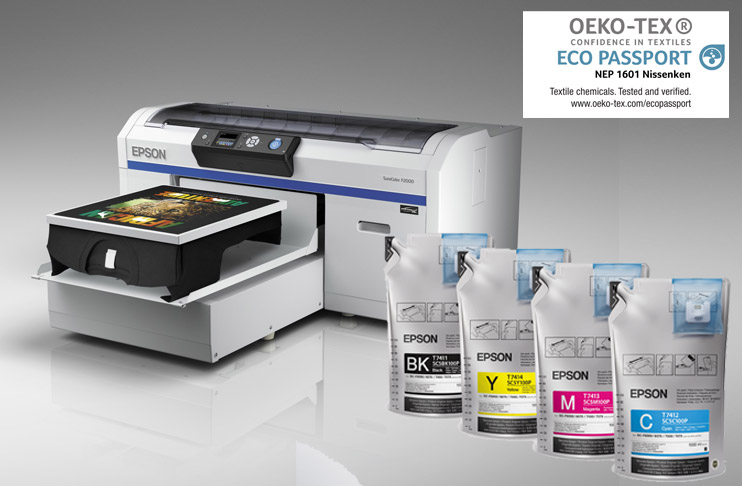Receiving Eco Passport certificate guarantees a production that is sustainability oriented and distant from harmful chemicals, Epson became the first company in Japan to win this certificate.
Epson recently became the first company in Japan to receive the Zurich-based International Oeko-Tex Association’s Eco Passport certification for sustainable textile chemicals. Certification was obtained through the Nissenken Quality Evaluation Center (“Nissenken”), the only certification institute in Japan for Eco Passport. Certified products include the UltraChrome DS ink for the SC-F60, SC-F62, SC-F70, SC-F71, SC-F72, and SC-F92 series’ of SureColor dye-sublimation transfer printers, as well as for UltraChrome DG ink and auxiliary fabric preparation products for the SureColor SC-F2000 garment printer.
In Japan, the Eco Passport certification system was launched by Nissenken in June 2016. Following on the heels of the Oeko-Tex Standard 100, a worldwide safety certification system in which textile products are tested for harmful substances, Eco Passport is a new testing and certification mechanism that textile chemical manufacturers and suppliers can use to demonstrate that their colorants, auxiliaries, finishing assistants, and other textile chemicals can be used in safe and sustainable textile production. The Eco Passport initiative seeks to confirm compliance with restrictions enacted in April 2016 on the use of certain arylamines and to ensure the safety and sustainability of chemicals, colorants, and auxiliaries upstream in the textile industry supply chain.
Epson, which offers a range of inkjet printers equipped with the company’s powerful Micro Piezo technology, is promoting the digitalization of textile and garment printing. The company’s dye-sublimation transfer printers, garment printers, and digital inkjet textile printers enable faithful color reproduction on textiles, which is difficult to achieve with analog printing processes. They also render complicated designs down to the finest details while shortening the printing process.
To enable it to provide the same high level of product quality in any country and region in the world, Epson has established unified quality assurance and product safety management policies. Epson’s product safety and environmental compliance requirements are set forth in the Epson Quality Standard (EQS). This comprehensive set of unified standards is implemented across the Epson Group. EQS specifies independent controls that the company widely implements to meet or exceed legal and regulatory requirements in each country.
Epson applied to Nissenken for Eco Passport certification to reassure its customers that its textile products meet international safety standards. Going forward, Epson will seek to contribute to the development of a sustainable society by providing customer value in the form of reduced environmental impacts across the life cycles of its products and services.
We are happy with increasing the trust in Epson
Stating that they are happy to be considered worthy of Eco Passport by Oeko-Tex®, Epson Türkiye Pro-Graphics Channel Manager Özgür Özata stated thusly; “As Epson, we are always looking for ways of contributing to a sustainable society by decreasing the environmental effects of our products. Receiving Eco Passport certificate, we provide even more confidence to our customers and shareholders about our textile ink and printers’ meeting the highest, international security standarts.”
Oeko-Tex® Eco Passport certificate provides the guarantee that Epson’s inkjet printer and inks meet the highest standards in environmental sustainability and doesn’t contain harmful substance.


